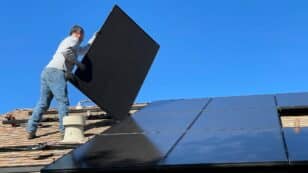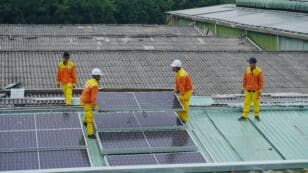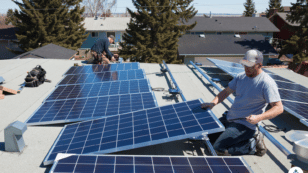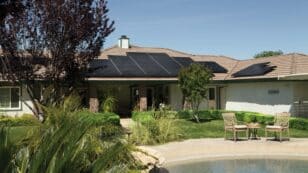
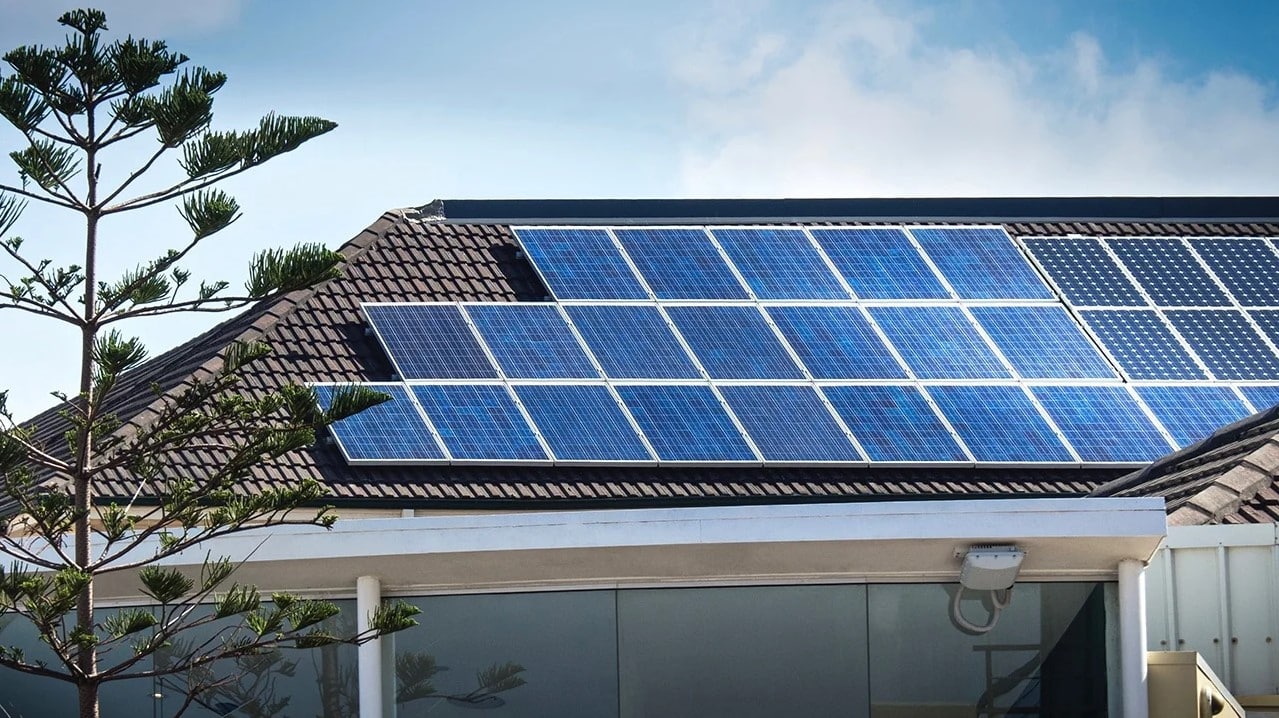
Solar Leasing Guide 2024
In this EcoWatch guide on solar panel leasing, you’ll learn:
- How solar leasing differs from a Power Purchase Agreement (PPA)
- What the typical solar lease terms are
- How buying solar panels compares to leasing them
- What happens if you want to end your solar lease
This guide has helped thousands of homeowners go solar with confidence because they knew they made the best financing decision for their homes. Let’s get started!
Each product and or company featured here has been independently selected by the writer. You can learn more about our review methodology here. If you make a purchase using the links included, we may earn commission.
Solar power is among the most affordable renewable energy options, whether for businesses or homes. Companies that provide solar products are everywhere these days, but to take advantage of the benefits of solar energy, homeowners are faced with a major decision: solar leasing vs. buying panels outright.
A solar lease is a long-term contract between a customer and a solar panel provider. For homeowners seeking to fulfill their energy needs without high utility bills, but who don’t have the upfront capital to buy a system, solar leasing can seem like a viable option.
What is Solar Leasing and How Does it Work?
Solar leasing is a financing option through which customers pay a monthly fee for the panels and get to use the power the system produces. They do not, however, own the panels. It is an arrangement similar to leasing a car — the idea is to provide a convenient and affordable option for those who want to go green and reduce their electricity bills without the overhead of buying a solar energy system.
There are many benefits to going solar, but solar leasing also offers its own unique set of benefits. First, it reduces a customer’s upfront costs to install panels, often to $0. Using a solar lease means the maintenance and liability to damaged panels rests on the solar company rather than the homeowner. However, because you do not own the panels, you miss out on incentives like local and federal tax credits.
Typical solar leases last for 20 years, and they include a solar lease escalator that increases the monthly installment once per year based on current market prices and the energy landscape. Many solar leases come with the option to buy the solar panels at a discounted rate at the end of the lease agreement (again, similar to a car).
Solar leasing was especially important in the early days of solar when systems were more expensive, but as the cost of solar panels has decreased and financing options have gotten more creative and accessible, leasing doesn’t make as much sense as it used to.
Leasing vs. Power Purchase Agreement (PPA)
In many ways, solar leasing presents a competitive option compared with a solar power purchase agreement (PPA). For solar leasing, customers pay monthly rent for the panels and get access to all of the energy the panels generate; with a PPA, customers instead pay per kilowatt-hour (kWh) of energy generated, so they effectively still pay an electric bill, but usually at a slightly discounted rate and mostly for electricity coming from the panels.
In other words, the amount customers pay for a solar lease is determined based on the capacity of the panels, while a solar PPA is paid based on the actual energy consumption.
This difference means that those with solar leases will have a more fixed price, benefit more during the sunny summer months and save even more money in the long run from reduced energy bills.
While both solar leasing and solar PPAs are contracts by which the customer doesn’t actually own the solar panels, the specifics of costs, reliability, savings and more differ and require consideration by the individual building owner.

SunPower

Nationwide Service
Average cost
Pros
- Most efficient panels on the market
- National coverage
- Cradle to Cradle sustainability certification
- Great warranty coverage
Cons
- Expensive
- Customer service varies by local dealer
SunPower designs and installs industry-leading residential solar and storage solutions across all 50 states. With a storied history of innovation dating back to 1985, no other company on this list can match SunPower’s experience and expertise.
SunPower earns its position as the top national installer on our list for a handful of reasons: It installs the most efficient solar technology on the residential market, offers the most expansive service area and backs its installations with a warranty well above the industry standard. All the while, SunPower pioneers sustainability efforts within the industry.
If that weren’t enough, SunPower systems come packaged with products all manufactured in-house by its sister company, Maxeon. This means that your panels, solar cells, inverters, battery and EV chargers are designed to work together and are all covered under the same warranty.
SunPower’s biggest downside? Its high-efficiency panels are considerably more expensive than most of its competitors’ products. However, its powerful panels are workhorses that make up for the initial cost with more backend production (think about this like spending more money for a car that gets more miles per gallon).
Facts and Figures: SunPower
| EcoWatch Rating |
|---|
| Better Business Bureau (BBB) Rating |
| Year Founded |
| Average Cost ($-$$$$$) |
| Solar Services |
| Brands of Solar Equipment Offered |
| Warranty Coverage |
| 5 |
| A+ |
| 1985 |
| $$$$ |
| Solar Panels, Solar Batteries, EV Chargers, System Monitoring |
| SunPower Panels |
| 25-year all-inclusive warranty |

Blue Raven Solar

Regional Service
Average cost
Pros
- Industry-leading in-house financing
- Competitive pricing
- Excellent reputation
Cons
- Doesn't offer solar batteries (coming 2022)
We like Blue Raven Solar because it understands that, for most homeowners, the cost of solar presents the biggest barrier to entry.
For that reason, Blue Raven Solar developed an innovative solar financing plan that offers in-house, flexible, zero-money-down options. The results speak for themselves, as Blue Raven Solar is now one of the fastest-growing solar companies in the nation and was recently acquired by SunPower. Its BluePower Plus+ plan (exclusive to Blue Raven) mimics the flexible structure of a lease while still providing the greatest benefits of owning your system.
Eligible homeowners enjoy 18 months of solar power before having to pay their first bill. When coupled with the federal solar investment tax credit (ITC), the initial energy savings can offset more than a third of the overall cost of a system before requiring a dollar down.
In contrast, other installers can only offer similar financing through solar leases, PPAs or third-party providers (such as Mosaic or Sunlight). Third-party loan providers can complicate the process, while opting for a loan or PPA will disqualify you from some of solar’s biggest benefits (additional property value, federal solar tax credit and local solar incentives).
Facts and Figures: Blue Raven Solar
| EcoWatch Rating |
|---|
| Better Business Bureau (BBB) Rating |
| Year Founded |
| Average Cost ($-$$$$$) |
| Solar Services |
| Brands of Solar Equipment Offered |
| Warranty Coverage |
| 4.5 |
| A+ |
| 2014 |
| $$ |
| Solar Panels, System Monitoring |
| Trina Solar, Canadian Solar, SolarEdge, Silfab, SunPower |
| 25-year manufacturer warranty; 10-year workmanship warranty, 2-year production guarantee |
What Are the Typical Terms of a Solar Lease?
The terms of a solar lease are critical to understanding whether it’s the right route for you. Based on individual requirements, solar leasing companies can provide various lease terms, ranging from short to long periods. Typically, though, solar leases last 20 to 25 years.
Given that solar panels have an average lifespan in the range of 25 to 30 years, customers end up being able to utilize solar panels to their full lifetime potential, even if they don’t take the option to buy at the end. Different solar leasing companies will also offer opportunities for advanced services, including monitoring, lease payment and observation through mobile and web apps, although you also get these if you buy in cash or finance, in most cases.
Also included in these digital offerings are online portals through which customers can review their contract, make monthly payments and observe usage over time. As with the wider utility sector, solar customers are looking to choose companies with improved service and customizable solutions, all of which provide a better user experience.
Customers must also be aware that, typically, solar leases will require an annual payment escalator of 1 to 5% per year as a result of inflated electricity costs. These terms are spelled out clearly in the contract, though, so they should not come as a surprise.
Ending Your Solar Lease
Customers who choose to lease solar panels may find themselves in circumstances where they want to end their lease, such as if they are moving to a new home or they find that the lease payments plus electricity from the grid — if their system wasn’t sized properly — end up costing them more. Some solar leasing companies try to make this process as easy as possible, providing the option to transfer the lease to the new owners of the home or break the contract and remove the panels.
Unfortunately, it was common practice for companies years ago to hide high fees — sometimes up to $20,000 — for early lease termination in the contracts. This is no longer common, but you should be on the lookout for these fees if you plan on entering into a lease.
Even if you don’t break your lease early, it will come to an end eventually. When this happens, customers can either renew the same lease or cease the solar contract. In the latter instance, the solar company will dismount and remove the panels.
A last option is that customers can purchase the solar panels at a discounted rate (a price that is sometimes outlined in the contract at the time of the original solar lease).
If you want to know for sure how many panels you need, you can click below to connect with an EcoWatch-vetted installer and get a free estimate.
Is a Solar Lease Right for You?
The decision of whether to lease solar, buy solar panels outright, engage in a PPA, or simply ignore solar as an option is a very personal and major decision. To help with such decisions, here are a few pros and cons of solar leasing to keep in mind:
Pros of Solar Leasing
Solar leasing comes with many natural benefits, including the following:
- No need to pay high upfront costs of solar panel installation
- Locks in energy prices for the future, when the market may be volatile
- Avoid the potential headache of maintenance and monitoring of equipment
- Significant utility bill savings
- Reduced household carbon footprint
- Power production guarantees in solar leases mean payments can decrease if the panel doesn’t produce as anticipated, minimizing the risk
Cons of Solar Leasing
Solar leasing is certainly not for everyone, though, as these contracts can come with a certain level of risk and concern as well:
- As utility rates increase, the leasing price also increases each year and could undercut expected cost benefits.
- Since you do not own solar panels, you are not entitled to the federal solar tax credit (an average of $8,991 in the U.S.) and some local benefits.
- Although there isn’t a high upfront cost, over the system’s lifetime, you’ll likely end up paying an equivalent or higher amount than what you would have if you bought the solar panels outright.
- Leased solar panels don’t increase your home value like panels you own do, because they are not a part of the property you own.
- Breaking your lease may be an expensive hassle if you wish to move.
- Leasing may not be economically feasible if you are in an area without net metering.
Watch Below: A real estate agent, familiar with the solar financing landscape, gives his take on whether leasing solar panels is worth it
Leasing Solar Panels vs. Buying Solar Panels
Earlier generations of solar panels were expensive, so leasing them was a more obvious choice. But the past decade has seen the cost of solar panels plummet by more than 50%, according to the Solar Energy Industries Association (SEIA), shifting that calculus and making it more accessible and profitable to outright own your own home solar system. Our solar leasing vs buying guide provides more detail on our thought on leasing vs buying solar energy.
The cost information presented in this article is derived from a comprehensive analysis, incorporating data from multiple industry sources. The average cost per watt per state was calculated based on figures from Consumer Affairs, Energy Sage, and Berkeley Lab’s Electricity Markets & Policy Department. Additionally, monthly energy consumption and the average monthly cost of electricity were sourced from the U.S. Energy Information Administration, ensuring a well-rounded and accurate representation of the information presented.
FAQs: Solar Panel Leasing
Below are a few questions EcoWatch readers regularly send in about leasing their solar panels. If you have anymore, do not hesitate to contact us at contact@ecowatch.com!
A solar lease is a long-term (usually 20-year) contract that allows a utility company to install a solar power system on your roof without you purchasing the system. You pay monthly installments and annual price surges in exchange for the energy produced by these panels.
A solar lease may be worth it for people who do not wish to take up the hassle of maintaining solar panels or don’t have the money upfront or the credit to buy in cash or with a solar loan.
However, there are significant financial downsides, including not being eligible for the 30% federal solar tax credit, and potentially being locked into a contract with an expensive fee for early termination.
The monthly payments you make toward a solar lease will typically increase year over year due to a price escalator that accounts for inflation. Because of this, it’s likely you will end up paying an equivalent or greater amount than you would have paid if you were buying solar panels outright.
Leased solar panels don’t add value to your property, and contract cancellations can be a hassle if you are trying to sell your house before your lease is up. Further, because you are not the owner of the panels, you are not entitled to any financial rebates or tax incentives (like the investment tax credit).
Solar leasing tends to extend up to 20 to 25 years, which is about the average lifespan of solar panels. Once your lease is up, you have the option to either renew it, discontinue the services and get the panels removed, or buy the panels from the solar vendor at a discounted market rate.
Comparing authorized solar partners
-
- Most efficient panels on the market
- National coverage
- Cradle to Cradle sustainability certification
- Great warranty coverage
- Expensive
- Customer service varies by local dealer
A+Best National Provider1985SunPower Panels25-year all-inclusive warranty
Having trouble deciding? Click below and use our process to receive multiple quotes instead:

 233k
233k  41k
41k  Subscribe
Subscribe 


